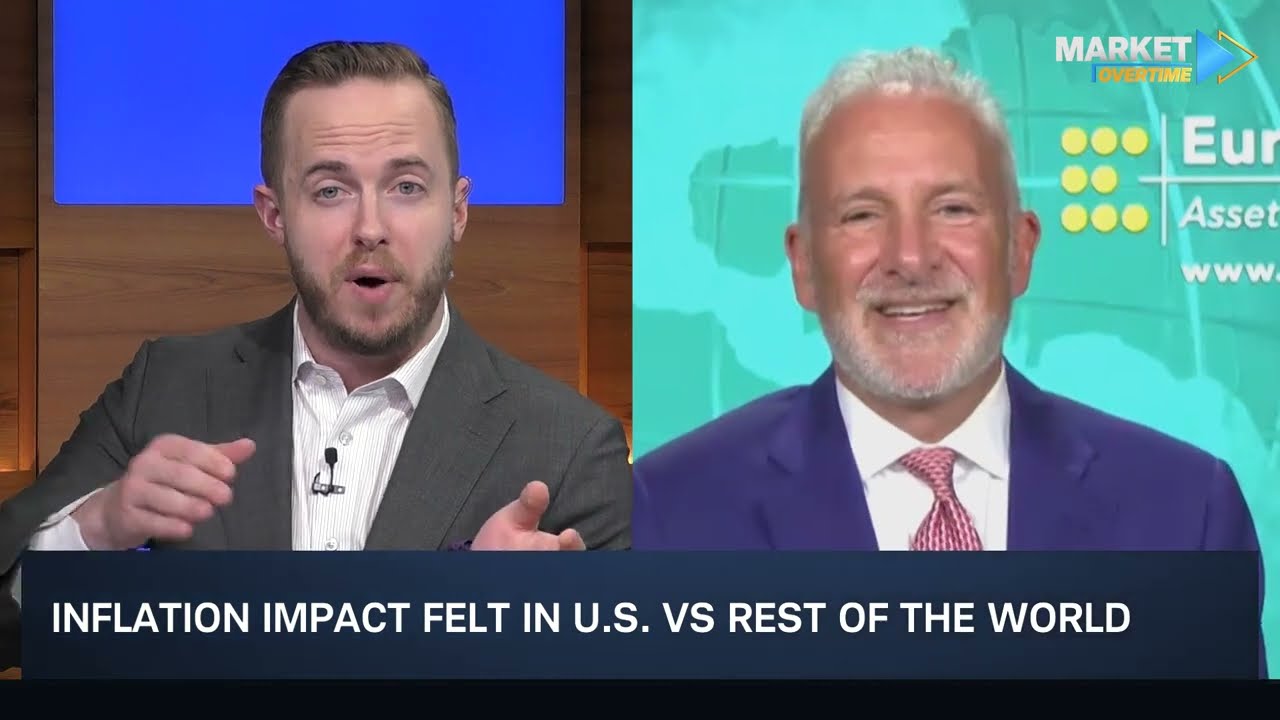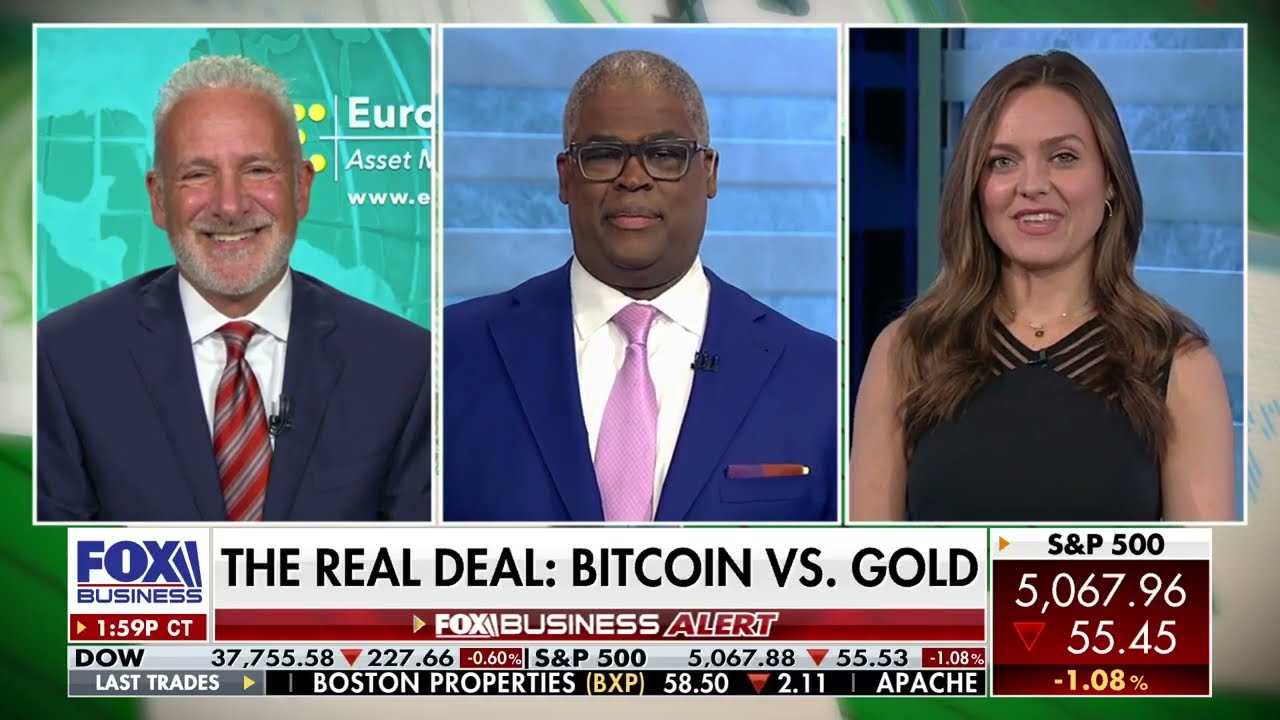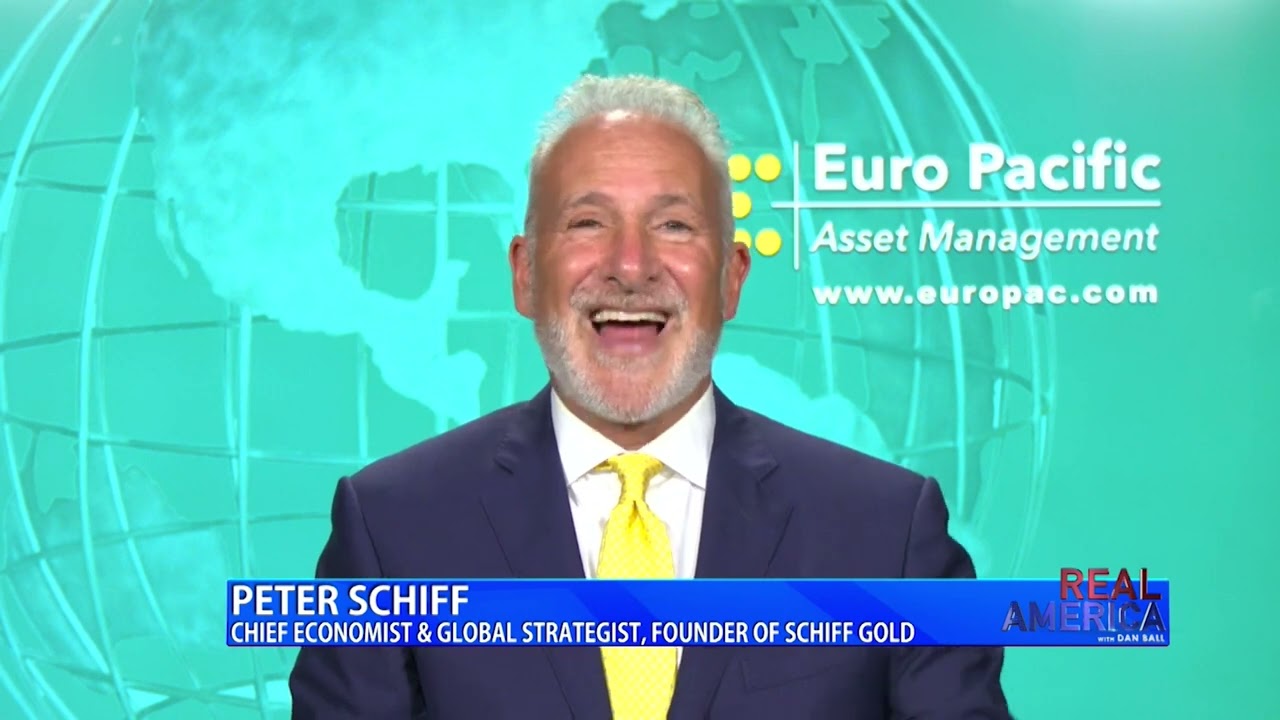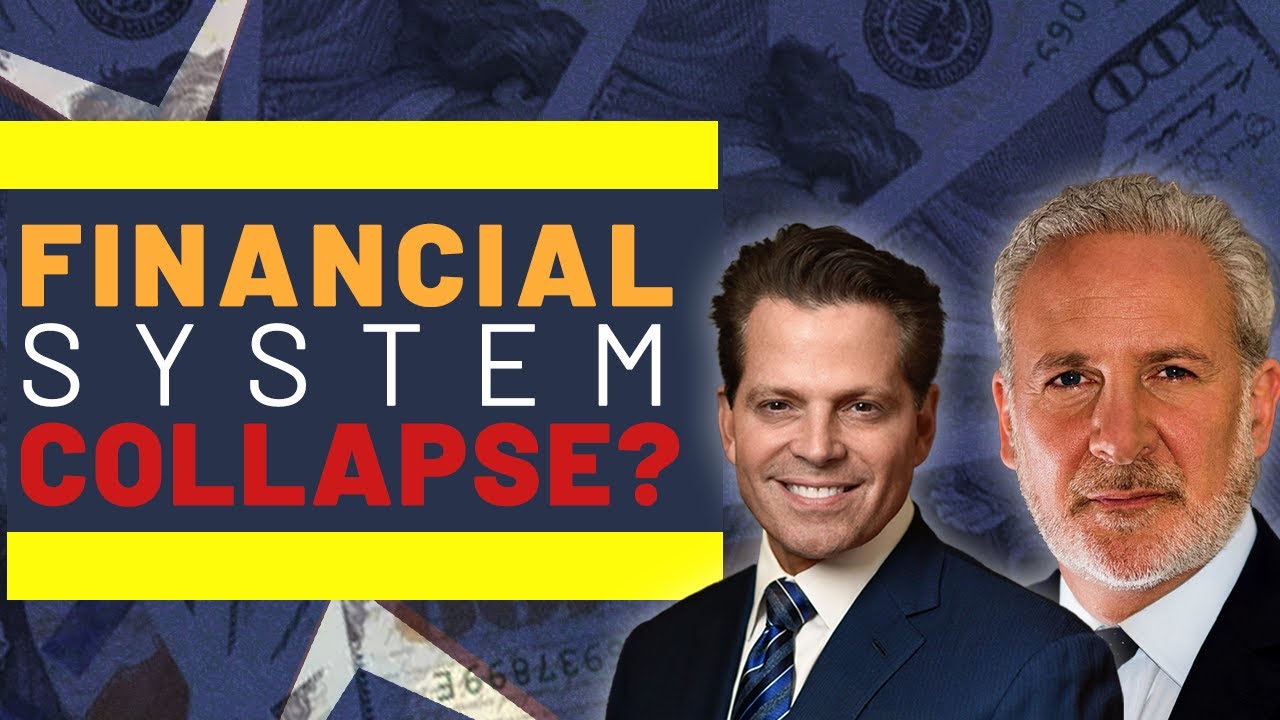Peter Schiff Debates Monetary Policy and Bailing on the Dollar (Video)
The Federal Reserve removed “patient” from its policy statement and the media exploded with speculation on what the move might mean. Peter Schiff appeared on a panel discussion on Canada’s Business News Network to address the idea that removing the word means the Fed intends to raise rates. The discussion turned into a lively debate about the real condition of the American economy.
There were three main parts to the debate. First, Peter warned that the Fed has no choice but to resort to more quantitative easing even if they won’t admit it:
We’re heading towards another recession unless the Fed unfortunately does another round of quantitative easing. The problem is once you start to stimulate an economy, the way the Fed has, there is no way out. It cannot turn off the monetary spigots without producing a severe recession and a financial crisis worse than the one we had in 2008. But the Fed cannot come out and admit that, so it plays these word games.”
In the second part, the other guests insisted that the economy is improving — it’s just a matter of managing expectations. Peter replied that the economy only looks better, because the Fed has been propping it up. He encountered a lot of friction during the discussion, and at one point he schooled another guest in “Economics 101.” When Tom Tzitzouris of Strategas claimed that deflation would lead to less consumption, Peter responded:
Do you own a cell phone? Do you own a television set? Do you own a computer? Why aren’t you waiting for falling prices? That is absurd. If you go back to economics 101, as prices go down, demand goes up. As prices go up, demand goes down. So as prices go down, people buy more.”
In the third part, Peter gave his strategy for managing investments in the face of a dovish Fed.
You’ve got to get out of the US. Buy this dip in the hard assets. Buy gold, buy oil, buy strategic, select equities around the world. Avoid the US, but there are pockets of economic strength. There are countries where I think you’ve got much better economic fundamentals than I think you do in the United States. But I think the case for the US economy, for the US dollar, is way overdone.”
Here are more highlights from the debate:
Peter Schiff: Well, I haven’t been calling for them to raise rates. I think that they should, but I know that they won’t. If you look at the Fed’s actual statement, they are more dovish now than they were when the word patient was part of the statement. This begs the question, why remove the word patient when they’re just as patient now as before? I think the Fed is still trying to bluff, they’re trying to pretend that they remain on this course headed for a destination that they will never reach, which is a rate hike. That is not what the Fed is going to do next.
The next thing the Fed is going to do is launch QE4. It’s going to fail just as miserably as QEs 1, 2, and 3, but they’re going to do it… The US economy is not recovering from anything. We have a gigantic bubble, and the Fed just doesn’t want to prick it. If they raise rates they will, but the problem is that with the absence of QE, the air is already coming out of this bubble rapidly. We’re heading towards another recession unless the Fed unfortunately does another round of quantitative easing.
The problem is once you start to stimulate an economy, the way the Fed has, there is no way out. It cannot turn off the monetary spigots without producing a severe recession and a financial crisis worse than the one we had in 2008. But the Fed cannot come out and admit that, so it plays these word games. By the way, the absence of inflation is not bad. Creating inflation is not a good thing. The economy will not benefit from more inflation. The reason the Fed wants inflation is because it wants to sustain the asset bubbles that it took so much time to inflate and it wants to help bail out the US government and every other debtor in the United States that has borrowed more money than they can repay. The only hope they have is default through inflation. That’s their game plan.
Benjamin Tal: [We’re not in a recession because the US has added hundreds of thousands of jobs.]
PS: They’re part-time jobs. We’re destroying full-time jobs. We’re creating jobs for older people who used to be retired, and now they have to work to pay their electric bill.
BT: [Young adults are coming out of their basements to get jobs and buy homes.]
PS: Home ownership is the lowest it’s ever been. Home ownership is at generational lows. Young people can’t afford to buy a house. They can barely afford to rent an apartment.
Tom Tzitzouris: [The economy is improving. It’s a matter of managing expectations.]
PS: The US economy has never been in worse shape than it is in right now. You just can’t perceive that because the Fed hasn’t taken away all the monetary supports. This is not a genuine recovery that you’re talking about. This is a gigantic bubble. It’s bigger than the housing bubble and the dot com bubble combined, you throw the bond market bubble in there — this is all fantasy. The Fed needs to kill this recovery because it’s phony. The reason that the economy’s in so much worse shape now is because the Federal Reserve, with its monetary policy, zero percent interest rates, quantitative easing, prevented the markets from fixing all the problems that were the result of interest rates being too low in the first place. Instead of dealing with our problems, the Fed made them a lot worse. Now unfortunately, the crisis that we’re looking at in the future is going to be much worse than the one that we would have experienced in 2008 had the Fed done the right thing and not done all this stimulus…
I think central bankers are behaving very foolishly around the world. They are deliberately cutting interest rates in pursuit of inflation, as if that’s the holy grail of economics. I think this is going to backfire. I think the inflation rates around the world are going to end up being much higher than these central banks bargained for. I think that what you’re going to have is these central banks increasing interest rates around the world at the time the Federal Reserve is doing QE4.
I think the currency markets are prepared for the opposite of what’s actually going to happen. They think everybody in the world is going to be easing, and the Fed is going to be the only central bank tightening. We’re going to be doing QE4, and other central banks are going to be trying to put out the inflationary fires that they lit on purpose… We did get inflation. A lot of it was exported. America has a huge trade deficit so a lot of it was exported. We ship our dollars out and we import goods, so that keeps a lid on it. Plus our CPI is very disingenuous. Prices have risen a lot faster than the government admits, so people are feeling the effects.
Of course, we inflated bubbles in the real estate market and the stock market and the bond market which the Fed is trying to prevent from popping. Other countries can handle higher interest rates. Other countries aren’t mired in debt like the United States. There are responsible countries out there that have been saving and producing and have surpluses. Everybody isn’t a reckless spender and borrower like the United States. Now there are other countries that are in a problem too. We’re not alone, but I think our problem’s a little larger and we’re more dependent than any other country on cheap money and these low interest rates. Our economy will suffer more if our rates go up.
BT: [I prefer deflation over inflation any day. We don’t know how to fight deflation.]
PS: You don’t have to fight deflation. Embrace it. It’s a good thing. That’s how your living standard improves.
BT: [If prices are going down, you don’t buy anything.]
PS: Do you own a cell phone? Do you own a television set? Do you own a computer? Why aren’t you waiting for falling prices? That is absurd. If you go back to economics 101, as prices go down, demand goes up. As prices go up, demand goes down. So as prices go down, people buy more. This is complete absurdity…
You’ve got to sell this rally in the dollar. It may be one of the last great opportunities to bail on the US currency. That certainly includes dollar-denominated debt like Treasuries. Inflation may be good for debtors but it’s lousy for creditors, and it’s even lousier for an economy. You’ve got to get out of the US. Buy this dip in the hard assets. Buy gold, buy oil, buy strategic, select equities around the world.
Avoid the US, but there are pockets of economic strength. There are countries where I think you’ve got much better economic fundamentals than I think you do in the United States. But I think the case for the US economy, for the US dollar, is way overdone. It’s a very crowded trade. People have this completely wrong. I think people right now are more wrong about the US than they were on the eve of the 2008 financial crisis. We’re at the peak of the dot com bubble… I think that you could invest in Canada, I think there are some names there that we like. Also I think you could look at Australia and New Zealand and Scandinavia… Southeast Asia, some of the emerging markets.
In fact, if you look at the valuation of the US stock markets versus the emerging markets, I’ve never seen the US so expensive or these other markets so cheap. There are a lot of bargains out there, particularly if you happen to have US dollars to go shopping. People talk about the strong dollar, go take a vacation, but I’d rather use those overpriced dollars to buy real assets before the bottom drops out of the dollar and people realize just how worthless they are.
Get Peter Schiff’s latest gold market analysis – click here – for a free subscription to his exclusive weekly email updates.
Interested in learning more about physical gold and silver?
Call 1-888-GOLD-160 and speak with a Precious Metals Specialist today!



 Peter recently appeared on Market Overtime with Oliver Renick for an interview. In their wide-ranging discussion, Peter speaks on monetary policy, the reliability of inflation data, and reasons to avoid Bitcoin.
Peter recently appeared on Market Overtime with Oliver Renick for an interview. In their wide-ranging discussion, Peter speaks on monetary policy, the reliability of inflation data, and reasons to avoid Bitcoin. Peter recently appeared on Fox Business to discuss Bitcoin’s recent performance. In this segment, he takes on Natalie Brunell, host of the podcast Coin Stories, in a friendly debate on the merits of crypto and precious metals.
Peter recently appeared on Fox Business to discuss Bitcoin’s recent performance. In this segment, he takes on Natalie Brunell, host of the podcast Coin Stories, in a friendly debate on the merits of crypto and precious metals. On Thursday, Peter appeared on OAN’s Real America with Dan Ball to discuss the U.S. Strategic Petroleum Reserve, the costs of home ownership, and the debt crisis. Peter argues the Biden administration won’t be able to refill the reserve, given oil’s 22% price increase this year. With the CRB exploding, Jerome Powell’s claim that inflation is coming […]
On Thursday, Peter appeared on OAN’s Real America with Dan Ball to discuss the U.S. Strategic Petroleum Reserve, the costs of home ownership, and the debt crisis. Peter argues the Biden administration won’t be able to refill the reserve, given oil’s 22% price increase this year. With the CRB exploding, Jerome Powell’s claim that inflation is coming […] Last week, Peter was interviewed on Speak Up with Anthony Scaramucci. In their conversation, they covered a wide range of important topics, including inflation, the fate of the dollar, and the trade-offs between gold and cryptocurrency.
Last week, Peter was interviewed on Speak Up with Anthony Scaramucci. In their conversation, they covered a wide range of important topics, including inflation, the fate of the dollar, and the trade-offs between gold and cryptocurrency.  This weekend, Todd Sachs interviewed Peter on the state of the economy. They discuss the parallels between now and the 2007-2008 housing crisis, the role of economic sentiment in voters’ opinions, and why foreign central banks are losing faith in the dollar.
This weekend, Todd Sachs interviewed Peter on the state of the economy. They discuss the parallels between now and the 2007-2008 housing crisis, the role of economic sentiment in voters’ opinions, and why foreign central banks are losing faith in the dollar.
Great debate ..Peter kicked ass …..I must say for those who own hard assets and those with mortgages …would rather have inflation …. along with your salary going up , the value of your house will rise therefore giving you more equity , as well as your other hard assets like silver and gold …as well as stocks ….so what if milk price rises , eggs, papers towels , diapers for your kid ….you won’t be complaing when your hard assets increase along with pay check …..